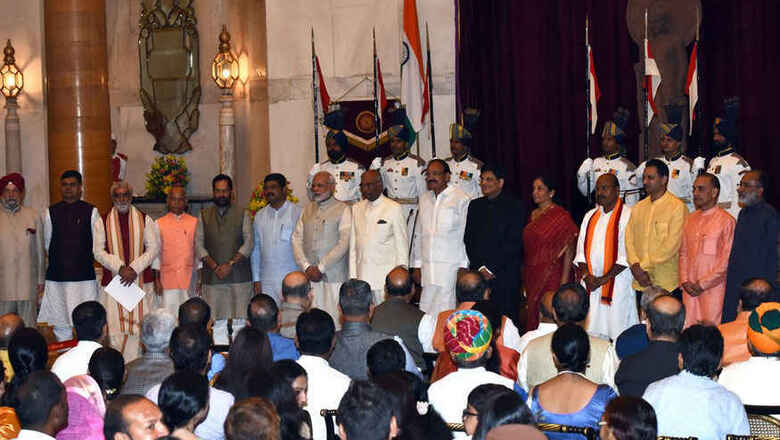
views
New Delhi: The latest Cabinet reshuffle has naturally evoked copious response in the TV media – already the Sunday newspapers were full of the details regarding the exits and the new arrivals, even though there was much speculation on the new portfolios. Was this a routine change – ‘blue bed to the brown’? Should we read any messages, telegraphed by Prime Minister Narendra Modi? Is this indeed a first major step since PM announced last week the goal of ‘New India’ by 2022.
It is necessary to comprehend that after nearly 65 years of governance, almost all Human Index Parameters in India have declined, to the extent of that India is nearly at the bottom of every international comparison.
In 1947, with the major institutional strength that India enjoyed, the expectation was that if the country consolidated itself politically and geographically, it would have been a world leader by now – this has not been the case, for variety of reasons, primarily misgovernance and escalating corruption; the political class has let us down in the past.
It is also a fact that the present government has sharply improved the administrative ethos at the Centre, even though the administrative decline in the states has not abated – on the contrary!
Major steps have been taken in the past three years on the economic field, primarily addressing the generation of black-money, and rationalizing the economic system, through a number of measures including GST and others. It will take few years to see the results – surely these are significant positive measures. However, a number of social sector issues had hitherto remained practically unaddressed, including in the fields of education, public health, water management, and attention to tiny / micro units.
This is the background, in a steadily declining economy and society, that the Prime Minister has made the major call for ‘New India’ – it will be naïve to expect that the adverse governance baggage of six decades can be got rid of overnight. The Aegean mess will take some time to clear up. These should be seen in backdrop of the latest Cabinet reshuffle.
Two or three elements are quite clear. Performance by ministers will be measured as a major index of continuation or removal – e.g. Rajiv Rudy, Kalraj Mishra, Bandaru Dattatreya and others.
It is equally significant that the replacements in the ministries dealing with MSME (tiny and small units), skills and employment, labour are seen to be capable, and are expected to deliver results. It is also a clear recognition that the issues of water management, employment etc have potential to destabilize the system over the next decade or so. The sectors of education and public health are equally if not more critical, though having a longer fuse – was it for political reasons that no change took place in these sectors?
Much has also been said on the induction of four ex-bureaucrats into the Cabinet; indeed two of them not even members of Parliament, which is a departure from general past practice. Many opposition politicians have described it as succumbing to ‘officer-shahi’.
It should be noted that all of the new inductees have outstanding performance records, enjoy excellent reputation, and are seen as go-getters. Again, it is not to be seen totally as an innovation – recall that Montek Ahluwalia, Mani Shankar Iyer, Natwar Singh and so many others had held ministerial berths, even though in hindsight their contribution to administration has been questionable – was it due to overall bad governance at the top?
Seventy years of administration has not clearly established that the leadership in the ministries is best done by politicians – it can be credibly argued that having politicians in senior administrative positions can be negative, with honourable exceptions.
China or Singapore, among others, are clear examples of technocrats delivering results as leaders of ministries. Note that in the US, which follows the Presidential system, the executive heads are nominated by the President.
Indeed there may be a case to consider shifting to the Presidential form in India – without going into details, the public may gain more than they lose. Note that for all practical purposes, the states are de-facto run on the Presidential model with the Chief Minister calling all the shots – it is not much different for most of the time at the Centre.
Also, it has to be noted that during the President Rule periods (Article 356), it cannot be argued that the governance is inferior to that during Cabinet rule – all anecdotal evidence may indicate otherwise! If Modi’s new move is interpreted as bringing talent to ministerial positions, this should be strongly welcomed – not necessarily only through bureaucrats, but also inducting from society at large; surely with odd exceptions, we will have better governance.
Some political commentators have referred to non-representation from other parties, referring to this optimistically as the collapse of NDA! Without any political insight into this matter, it can be speculated that when the Tamil Nadu situation clarifies in the near future, there is a possibility that this issue may be effectively addressed – it is probably not for nothing that many Cabinet Ministers hold more than one portfolio in the reshuffled Cabinet!
Finally, should one conclude that this reshuffle will significantly contribute to creation of ‘New India’? Surely not, it can at best be a first step. The key prerequisites include a major cleanup of the political and electoral systems, and addressing large scale corruption in the state governments. There is as yet no evidence of any steps taken in this direction. We still have a long way to go. The Indian is always an optimist – he currently trusts Modi – this opportunity should not be lost.
(The writer is former cabinet secretary of India. Views are personal.)
















Comments
0 comment